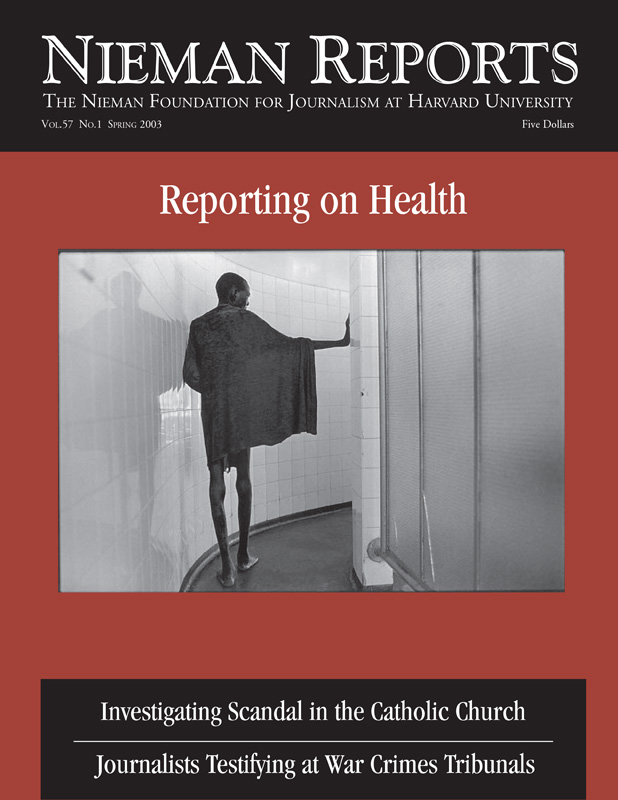The December election of South Korea’s new president, Roh Moo-hyun, writes In-Yong Rhee, a news commentator for Seoul’s Munwha Broadcasting Corporation and current Nieman Fellow, was a “victory of the Internet, where the driving force of the young generation is bringing a shift in media power, creating what can be described as a ‘cyber Acropolis.’” He describes how online news services emerged as an important source of information for younger voters who are more distrustful of newspapers. “… frustrated young voters saw the Internet as an outlet where they could spill out their diverse views and create a counteragenda forum against the conservative papers,” he writes. In this election’s wake, the influence of major conservative newspapers is waning, and the Internet has emerged as a powerful media force.
In her story about the life of former Chinese journalist and author Peter Liu, Yvonne van der Heijden, a Beijing-based correspondent with the Netherlands Press Association and the Financial Economic Times of Belgium during the 1990’s, describes the reporting help he gave her by putting developments in China into a broader perspective. She also provides glimpses of the harsh life he experienced under Mao’s rule, as told through his recently published autobiography, “Mirror: A Loss of Innocence in Mao’s China.”
Nicholas Daniloff teaches journalism at Northeastern University in Boston and at the Uzbek State World Languages University in Tashkent, Uzbekistan. It is his Uzbek experience that Daniloff writes about, as he explains what it is like to lecture (in English) to students majoring in international journalism on “the virtues of independent media” when they live in a country with “a miserable human rights record, including Soviet-style censorship.” Uzbekistan’s president created this Center for International Journalism in 1999 where several American professors teach. When Daniloff asked the former rector what he hoped the program would accomplish, he replied: “I want them to encourage the students to tell the truth. We must plant the seeds of free discussion. I’m not sure we’ll see the fruits in our lifetime, but we must plant now.”
Watson Sims, who was a foreign correspondent for The Associated Press and editor of newspapers in Michigan and New Jersey, describes how between 1984 and 1990—in visits arranged under the auspices of the American Society of Newspaper Editors and the Union of Soviet Journalists—115 American and Soviet editors learned from and about each other as various delegations assembled in the two countries. “The hundreds of articles published as a result of the exchanges undoubtedly had an impact on public opinion in both countries,” writes Sims, who was a participant. As one editor commented after his visit to the Soviet Union in 1987, “Americans don’t really understand Russians, and they don’t understand us.” At the start of the 21st century, Sims worries about whether Russian journalists—given the nation’s economic and political circumstances—will remain able to ask questions they need to ask.
In her story about the life of former Chinese journalist and author Peter Liu, Yvonne van der Heijden, a Beijing-based correspondent with the Netherlands Press Association and the Financial Economic Times of Belgium during the 1990’s, describes the reporting help he gave her by putting developments in China into a broader perspective. She also provides glimpses of the harsh life he experienced under Mao’s rule, as told through his recently published autobiography, “Mirror: A Loss of Innocence in Mao’s China.”
Nicholas Daniloff teaches journalism at Northeastern University in Boston and at the Uzbek State World Languages University in Tashkent, Uzbekistan. It is his Uzbek experience that Daniloff writes about, as he explains what it is like to lecture (in English) to students majoring in international journalism on “the virtues of independent media” when they live in a country with “a miserable human rights record, including Soviet-style censorship.” Uzbekistan’s president created this Center for International Journalism in 1999 where several American professors teach. When Daniloff asked the former rector what he hoped the program would accomplish, he replied: “I want them to encourage the students to tell the truth. We must plant the seeds of free discussion. I’m not sure we’ll see the fruits in our lifetime, but we must plant now.”
Watson Sims, who was a foreign correspondent for The Associated Press and editor of newspapers in Michigan and New Jersey, describes how between 1984 and 1990—in visits arranged under the auspices of the American Society of Newspaper Editors and the Union of Soviet Journalists—115 American and Soviet editors learned from and about each other as various delegations assembled in the two countries. “The hundreds of articles published as a result of the exchanges undoubtedly had an impact on public opinion in both countries,” writes Sims, who was a participant. As one editor commented after his visit to the Soviet Union in 1987, “Americans don’t really understand Russians, and they don’t understand us.” At the start of the 21st century, Sims worries about whether Russian journalists—given the nation’s economic and political circumstances—will remain able to ask questions they need to ask.



